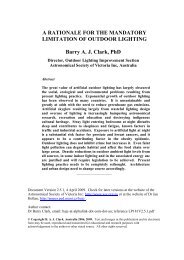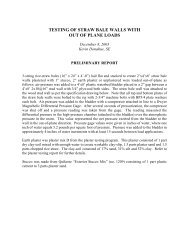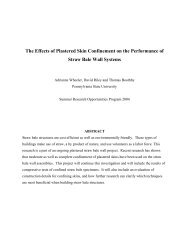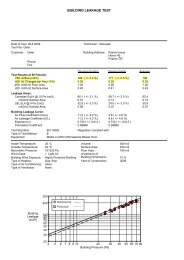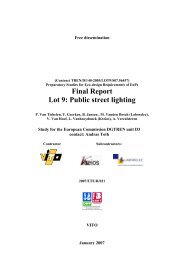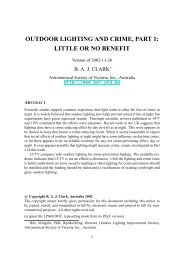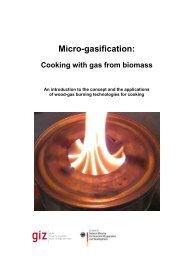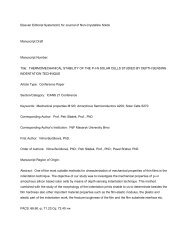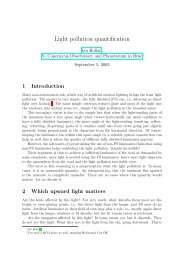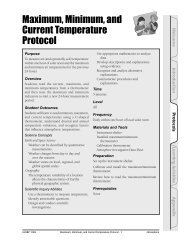Outdoor Lighting and Crime - Amper
Outdoor Lighting and Crime - Amper
Outdoor Lighting and Crime - Amper
You also want an ePaper? Increase the reach of your titles
YUMPU automatically turns print PDFs into web optimized ePapers that Google loves.
7. OUTDOOR LIGHTING STRATEGIES<br />
The evidence already presented seems sufficiently compelling to justify early action to try to<br />
control the growth of crime by stopping or reversing the growth of outdoor lighting. Even if<br />
subsequent research indicates the hypothesis to be in need of modification or wrong, the<br />
evidence would still st<strong>and</strong>. This, plus the parallel need for reduced lighting on health, safety<br />
<strong>and</strong> environmental grounds is so strong <strong>and</strong> the risk of increased crime so small (see Part 1)<br />
that the process should start <strong>and</strong> continue regardless.<br />
This Chapter explores whether outdoor lighting might be reduced in relatively benign ways.<br />
Note that there is absolutely no call for the outright removal of outdoor artificial lighting, an<br />
emotive misrepresentation already sometimes made by opponents of sky-friendly lighting<br />
reform.<br />
7.1 THE DILEMMA<br />
Modern artificial light at night has certainly brought about a profound <strong>and</strong> beneficial<br />
transformation of human existence. Productivity <strong>and</strong> some aspects of quality of life have<br />
improved with the extensions of working hours <strong>and</strong> recreational activities into the natural dark<br />
hours. But there are negative consequences also. For example, shiftwork is a necessary part<br />
of extended hours of business <strong>and</strong> extended night life, but shiftwork tends to be surrounded by<br />
quality of life issues including health fears <strong>and</strong> reduced or fragmented social contact with<br />
families <strong>and</strong> friends.<br />
Conventional wisdom is that customers entering or leaving daylight-like indoor lighting<br />
conditions when shopping at night should not face steep lighting gradients, so the immediate<br />
off-premises area needs to be brighter than typical outdoor levels at night. In turn, this results<br />
in pressure on city authorities to increase outdoor illumination levels nearby. However,<br />
extended exposure to bright light at night can lead to the sleep <strong>and</strong> health problems mentioned<br />
in Section 6.1.4. Regardless, extended hours of business, retail <strong>and</strong> entertainment activity in<br />
cities is the current reality, <strong>and</strong> extensive bright outdoor lighting is an established part of this<br />
in attracting customers <strong>and</strong> allaying the fear of crime at night.<br />
Our fuller lives at night now appear to have come at the heavy cost of more crime by day <strong>and</strong><br />
night. Can we have our nightlife ‘cake’ without it biting us? Present indications are<br />
pessimistic. The current state of crime prevention <strong>and</strong> criminal justice is already the result of<br />
centuries of evolutionary development <strong>and</strong> expenditure of lots of public <strong>and</strong> private money,<br />
but crime still seems to be gaining. If the new hypothesis is true or even partly true, however,<br />
it does provide a prospect of retarding the growth of crime or even reversing it.<br />
Might we have to take the extreme step of turning all the outdoor lights off <strong>and</strong> generally<br />
going back to being awake by day <strong>and</strong> staying home at night? Are worthwhile gains possible<br />
by the less drastic step of reducing outdoor lamp wattages? Is there some way of<br />
compensating for any resulting increase in fear of crime? It will take some ingenuity even to<br />
devise field experiments that avoid apparent disadvantage to some sections of the noncriminal<br />
community.<br />
103



